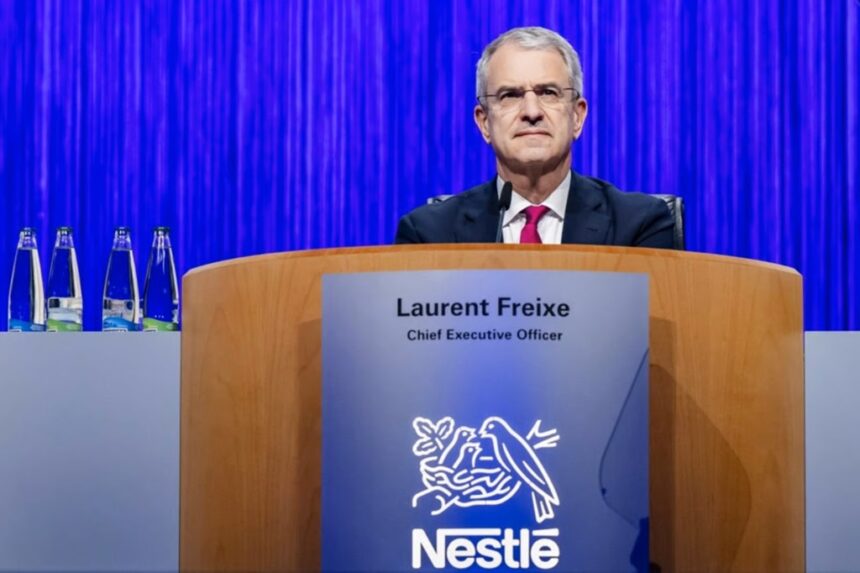VEVEY, Switzerland, In a stunning development that has rocked the corporate world, Nestlé S.A., the world’s largest food and beverage company, announced the immediate dismissal of its Chief Executive Officer, Laurent Freixe, on September 1, 2025, following an investigation into an undisclosed romantic relationship with a direct subordinate.
The Switzerland-based company, known for staples like Nescafé, KitKat, and Purina, pointed to a violation of its business code as the main reason for this decision. Chairman Paul Bulcke described the move as necessary, highlighting Nestlé’s focus on strong governance. This latest change marks the second CEO exit at Nestlé in just over a year, adding to uncertainty in the company’s top ranks.
The review into Laurent Freixe’s actions started in spring 2025, triggered by anonymous tips submitted through Nestlé’s “Speak Up” hotline. This internal reporting line is a safe way for staff to share ethical worries. An initial inquiry did not produce clear evidence, but ongoing suspicion led the board to carry out a more detailed review.
Chairman Paul Bulcke and Lead Independent Director Pablo Isla oversaw the second investigation with help from outside lawyers. This process verified that Laurent Freixe had not only kept his relationship secret from the company but had also broken rules meant to prevent conflicts of interest between supervisors and their direct reports.
Laurent Freixe, a 63-year-old French national who joined Nestlé in 1986, first told the board he had not broken any conduct rules. Reports suggest that denying the relationship made matters worse, deepening the board’s concerns about his judgment and transparency. Following the review, the board dismissed Freixe without severance pay and has not named the other employee, citing the need to respect their privacy.
Laurent Freixe Ethics Scrutiny
Laurent Freixe’s removal comes while workplace relationships and corporate ethics are getting more attention worldwide. Recent incidents, including the removal of Kohl’s CEO Ashley Buchanan in May 2025 for business favours involving a partner, as well as McDonald’s firing of CEO Steve Easterbrook in 2019 for a relationship with an employee, show stricter standards in leadership behaviour. Nestlé’s quick decision signals to investors and staff that it values its rules and culture.
Laurent Freixe started at Nestlé in France in 1986 and worked his way up through marketing and sales roles. He became head of the Nutrition Division in France in 1999 and later took on senior roles across Europe, Latin America, and the United States. By January 2022, he led Nestlé’s Latin America division, a key position after the firm changed its structure.
When appointed CEO in August 2024, Laurent Freixe succeeded Mark Schneider, who left after nearly eight years due to lacklustre results and cultural issues. Many saw Freixe’s promotion as a return to hiring from within, and there were high hopes that he could address weak growth and falling share prices. Since 2022, the share price has dropped by nearly 40 percent.
Despite pushes for more advertising, product revamps, and focus on underperforming areas such as vitamins and water, Laurent Freixe could not regain investor trust. Nestlé shares lost 17 percent during its year at the top, while rival Unilever’s stock fell just 5 percent. The company also posted a 0.4 percent drop in sales volumes for the second quarter of 2025. His early departure fuels talk of ongoing instability within Nestlé’s top ranks.
Taking over as new CEO, Nestlé has named Philipp Navratil, a 24-year veteran at the firm. Navratil joined in 2001 as an internal auditor, served as country head for Nestlé Honduras in 2009, and then led the coffee and beverage business in Mexico from 2013 to 2020.
He managed global strategy for coffee brands like Nescafé and Starbucks from 2020, and in July 2024 became CEO of the Nespresso division. Navratil took his seat on the executive board in January 2025.
Chairman Bulcke commented on Navratil’s strong performance and collaborative style, and expressed confidence in his ability to deliver on Nestlé’s growth plans. In his first statement, Navratil said he was committed to the current business action plan and promised to work hard to build value for the company.
While Navratil’s appointment brings experience, some analysts say there could still be more disruption, especially with global trade factors like US tariffs affecting sales of products such as Nespresso capsules.
Nestlé’s Business in Thailand
Nestlé’s operations in Thailand, unaffected by the leadership change, add to the company’s global strength. Since 1893, Nestlé Thailand has become a fixture in the local food and drink sector.
With more than 7,000 employees and four plants in areas such as Ayutthaya and Nakhon Ratchasima, the business supplies popular goods from Nescafé coffee and Maggi seasonings to Nestlé Pure Life water, all suited to Thai tastes.
In 2024, Thai sales reached roughly THB 30 billion (around USD 900 million), lifted by steady demand for coffee, dairy, and cooking items.
Nestlé has also directed investments into new sectors in Thailand, opening the Nestlé Health Science facility in Rayong in 2023, focused on nutrition for an ageing population.
Sustainability is a growing priority, with projects to cut plastic waste and back local farmers under programmes like the Nescafé Plan, which supports sustainable coffee farming. Despite rising costs highlighted in the 2024 financial report, Thailand’s contribution remains stable and important for Nestlé’s wider business across Asia, Oceania, and Africa.
The departure of Freixe is only the latest in a run of key leadership changes. Chairman Paul Bulcke earlier announced plans to retire in 2026, and Executive Vice President Steve Presley left in April after nearly three decades. Combine this with Mark Schneider’s exit in 2024, and it signals a time of big shifts for the company.
Nestlé reported $101.5 billion in global sales for 2024, but sales slid by 1.8 percent in July, driven by climbing costs and changes in consumer habits, with more people using weight-loss treatments.
Market analysts, including Jean-Philippe Bertschy from Vontobel, point out that negative feedback is wearing on investor patience as the company tries to adapt in a tough market. Nestlé is also feeling the effects of trade issues and strong competition from brands like Unilever and Danone, which saw stronger sales in 2024. The new CEO, Philipp Navratil, now faces the task of steadying performance and winning back trust.
Nestlé’s Thai operations, meanwhile, remain strong and serve as a pillar for its presence in the region. For Navratil and the company as a whole, the coming period will test their ability to meet both internal and external tests.
The global business community will be watching to see whether Nestlé can regain its stability and hold on to its leadership in food and beverages.














